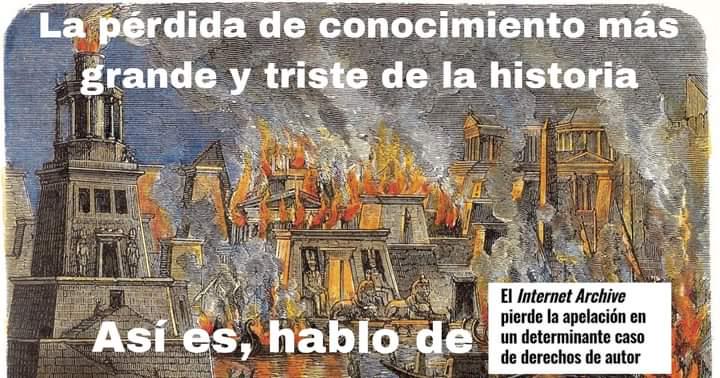Internet archive r.i.p


Nuevo invento: Internet Archive R.I.P revoluciona la preservación digital
En un avance sin precedentes para garantizar el acceso perpetuo a todo tipo de contenido digital, Internet Archive acaba de anunciar su nuevo invento llamado R.I.P (Resilient Information Preservation). Esta tecnología promete revolucionar la forma en que preservamos y accedemos a la información en la era digital.
¿En qué consiste Internet Archive R.I.P?
Internet Archive R.I.P es un sistema avanzado de preservación de datos que utiliza técnicas de almacenamiento redundante distribuido y cifrado de última generación para proteger el contenido digital de posibles pérdidas, daños o censura. En pocas palabras, se trata de crear copias de seguridad automatizadas de páginas web, libros electrónicos, vídeos, audios y todo tipo de archivos digitales, y almacenarlas de forma segura y accesible en múltiples servidores repartidos por todo el mundo.

Principales ventajas de este nuevo invento
- Resiliencia: Gracias a la redundancia distribuida, incluso si un servidor falla, el contenido se mantiene accesible desde otras ubicaciones.
- Durabilidad: Con el cifrado y múltiples copias, la información puede preservarse por décadas o incluso siglos.
- Accesibilidad: El contenido archivado estará disponible de forma libre y gratuita para cualquier usuario, promoviendo el acceso universal al conocimiento.
Internet Archive R.I.P es una apuesta firme por la preservación del patrimonio digital de la humanidad. Con este nuevo invento, se garantiza que generaciones futuras puedan acceder y consultar todo tipo de información y contenidos que de otro modo podrían perderse para siempre en el vasto océano de la web.
En definitiva, esta innovación tecnológica se presenta como una esperanzadora solución para superar los desafíos de preservar y difundir el conocimiento en el siglo XXI. Sin duda, un gran avance hacia la construcción de una biblioteca digital universal, libre y accesible para todos.

"Contexto: Internet Archive (considerada una de las bibliotecas más grandes de internet) ha perdido una demanda hecha por las grandes editoriales por su función de prestar libros digitales gratuitamente. Apenas hace unas horas se borraron un total de 500 mil libros y la cifra podría aumentar.
La idea de prestar libros digitales nació cuando en tiempos de pandemia se cerraron todas las bibliotecas del mundo, esto hizo que Internet Archive decidiera agregar dicha función.
Las demandas contra Internet Archive aún continúan, la industria discográfica también ha demandado a la organización sin fines de lucro por su proyecto "Gran 78" proyecto que busca digitalizar discos de 78 rpm para su conservación
La organización sin fines de lucro afirma que su misión es brindar “acceso universal a todo el conocimiento” y ha estado archivando contenido digital durante años, como libros, películas, música, software y más."
fuente
https://www.facebook.com/share/p/H6RKb16vY9qwdTzF/?mibextid=xfxF2i
[matched_content]
Certainly! Here’s an example of how you can add various social SEO tags to your HTML document:
<!DOCTYPE html>
<html lang="en">
<head>
<meta charset="UTF-8">
<meta name="viewport" content="width=device-width, initial-scale=1.0">
<title>Your Page Title</title>
<!-- Meta tags for SEO -->
<meta name="description" content="A brief description of your page content">
<meta name="keywords" content="keyword1, keyword2, keyword3">
<meta name="author" content="Your Name">
<!-- Open Graph tags for social media -->
<meta property="og:title" content="Your Page Title">
<meta property="og:description" content="A brief description of your page content">
<meta property="og:type" content="website">
<meta property="og:url" content="https://www.yourwebsite.com">
<meta property="og:image" content="https://www.yourwebsite.com/path/to/image.jpg">
<!-- Twitter Card tags for social media -->
<meta name="twitter:card" content="summary_large_image">
<meta name="twitter:title" content="Your Page Title">
<meta name="twitter:description" content="A brief description of your page content">
<meta name="twitter:image" content="https://www.yourwebsite.com/path/to/image.jpg">
<meta name="twitter:site" content="@YourTwitterHandle">
<meta name="twitter:creator" content="@YourTwitterHandle">
<!-- Facebook specific tags -->
<meta property="fb:app_id" content="your-facebook-app-id">
<!-- Google+ specific tags -->
<link rel="publisher" href="https://plus.google.com/yourgooglepluspage">
<!-- Schema.org markup for rich snippets -->
<script type="application/ld+json">
{
"@context": "http://schema.org",
"@type": "WebSite",
"url": "https://www.yourwebsite.com",
"name": "Your Website Name",
"description": "A brief description of your website"
}
</script>
</head>
<body>
<!-- Your page content goes here -->
</body>
</html>In this example, we’ve included various social SEO tags within the <head> section of the HTML document:
-
Meta tags for SEO:
description: Provides a brief description of the page content.keywords: Specifies relevant keywords for the page.author: Indicates the author of the page.
-
Open Graph tags for social media:
og:title: The title of the page.og:description: A brief description of the page content.og:type: The type of content (e.g., website, article, video).og:url: The URL of the page.og:image: The URL of an image to represent the page on social media.
-
Twitter Card tags for social media:
twitter:card: Specifies the type of Twitter Card (e.g., summary, summary_large_image).twitter:title: The title of the page.twitter:description: A brief description of the page content.twitter:image: The URL of an image to represent the page on Twitter.twitter:site: Your Twitter handle.twitter:creator: The Twitter handle of the content creator.
-
Facebook specific tags:
fb:app_id: Your Facebook App ID for insights and analytics.
-
Google+ specific tags:
publisher: The URL of your Google+ page.
- Schema.org markup for rich snippets:
- A JSON-LD script containing structured data about your website, including the URL, name, and description.
Remember to replace the placeholder values with your own content, URLs, and social media handles. Adding these social SEO tags can help improve the appearance and discoverability of your web pages when shared on social media platforms and in search engine results.